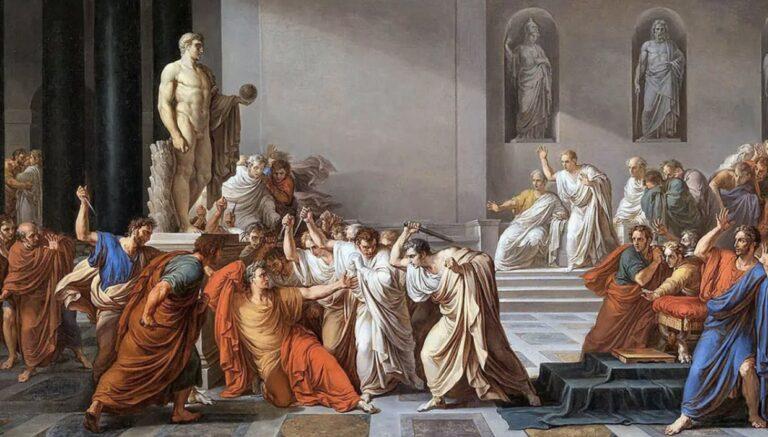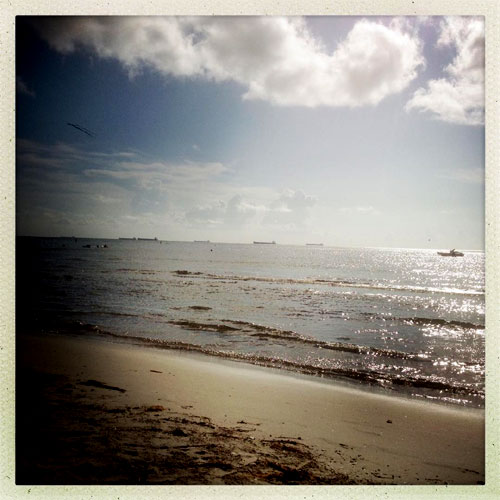570 A.D.: Birth of Muhammad (per the Shi’a calendar (others put it at April 20th)), (d.632).
711: Moorish troops cross the Strait of Gibraltar to land in mainland Europe, beginning the Muslim invasion of the Iberian Peninsula, known in Arabic as Al-Andalus (Andalucía in Spanish). The Moors (Berber Arabs from North Africa, recently converted to Islam) fought an eight year campaign against the Christian Visigoths under Roderick, on whose death in battle the Visigoth kingdom essentially collapsed, allowing the Moors to occupy virtually all of present day Spain and Portugal except for the Basque region in the north. The Moors made continued forays over the Pyrenees, eventually taking substantial regions of Gaul under their control. The high water mark for Moorish expansion into Europe occurred at the Battle of Tours (Poitiers) in October of 732. At that battle, Frankish and Burgundian forces under Charles Martel (known at the time as “The Hammer”) won a decisive victory that set the stage for the Christian re-conquest of western Europe, which ended with the final expulsion of the Moors from Grenada in 1492.
1429: Led by what she claims is a vision directly from God, the young shepherdess Joan of Arc arrives in Orleans, France to relieve the English siege of that city.
1492: Christopher Columbus receives his commission from the Spanish Throne (Ferdinand and Isabella) to explore a western route to the Spice Islands of the Indies.
1521: Three quarters of the way around the first circumnavigation of the world, Portuguese navigator and explorer Ferdinand Magellan is killed on Mactan Island in the Philippines, only three weeks after making peaceful and productive contact with the indigenous inhabitants. After his death, the expedition continued under the command of Juan Sebastian Elcano, who managed to extend the westward passage all the way back to Spain. One cannot overstate the hardships they endured on their circumnavigation: of the five ships and 234 men who departed three years earlier, Elcano finished with one ship and 18 men.
1599: Birth of Oliver Cromwell (d.1658), alternately remembered as: a) Lord Protector of the Commonwealth of Great Britain, Scotland and Ireland, or; b) Regicide for overseeing the execution of King Charles I.
1607: The English Virginia Company colonizing expedition led by John Smith (who was at that time confined below decks) makes its New World landfall at Cape Henry (here off Virginia Beach)
1770: Captain James Cook in HMS Endeavour makes landfall in Botany Bay, Australia. [The great explorer himself; Botany Bay.
1773: British Parliament passes the Tea Act, lowering direct taxation on the East India Company and compensating by mandating a monopoly for their tea trade with America.
1789: In New York City, Virginia planter, surveyor and Continental Army General George Washington is inaugurated as first President of the United States. The ceremony is notable for the pageantry that accompanied his travel from Mount Vernon, and the brown homespun suit he wore at the swearing in. Washington also established the tradition of placing his left hand on a family bible as he took the oath.
1789: After months of chafing under the abusive leadership of Captain William Bligh, Masters Mate Fletcher Christian leads 25 crewmen in a mutiny aboard HMS Bounty. The mutineers set adrift Bligh and 18 loyal crew members in an open 23 foot longboat. In an extraordinary feat of seamanship and survival, they navigate their way across 3600 miles of ocean to safely arrive at Timor in the Dutch East Indies on the 14th of June. Christian and the rest of the mutineers scuttle around the South Pacific trying to figure out what to do next. They eventually settle on remote Pitcairn Island, burning the Bounty to ensure their commitment to their new colonial effort.
1791: Birth of Samuel F. B. Morse (d.1872), American painter and inventor, who contributed to the development of the telegraph and Morse code. Born in Massachusetts, Morse attended Yale College and established himself as a portrait painter. His wife’s death inspired his work on the telegraph, and in 1844 he sent the first public message, “What hath God wrought,” from Washington to Baltimore.
1792: Three years into the social cataclysm that became the French Revolution, Claude Joseph Rouget de Lisle composes La Marseillaise, the new national anthem of the French Republic. The legitimately stirring music is accompanied by lyrics that English speakers would probably prefer to remain in French.
1803: The United States purchases from Napoleonic France the Louisiana Territory for $15,000,000. As part of an effort to disentangle French and Spanish claims over New Orleans, and to ensure adequate US access to the Mississippi River drainage through that city, President Thomas Jefferson sent James Monroe and Robert Livingston to France to negotiate buying the city outright. The French Emperor, Napoleon Bonaparte, having recently failed to re-enslave Haiti, and preparing for continuing war with Great Britain, believed that maintaining France’s claim on the entire Louisiana Territory would only be a drain on French finances and add nothing to the upcoming fight with Great Britain. He therefore countered Livingston’s $10m offer for New Orleans with a $15m bid for the whole territory. Recognizing the fleeting nature of the prize, Livingston took the offer on April 30th and a treaty confirming the sale was signed on May 2nd. The purchase created a constitutional crisis over whether the President had the authority to expand the United States in this manner. Jefferson himself was torn, and recognized that he would have opposed this expansion of Executive power if Alexander Hamilton had tried it. Napoleon, for his part, recognized the strategic nature of the sale: “This accession of territory affirms forever the power of the United States, and I have given England a maritime rival who sooner or later will humble her pride.”
1805: Led by a United States Agent and Marine Lieutenant Wesley O’Bannon, a small force of Marines and Berber mercenaries capture Derna, Tripoli and overthrow the anti-American pasha. Music lovers now hear something about The Shores of Tripoli ringing in their heads forever.
1810: Ludwig van Beethoven composes the piece beloved by piano students and their parents worldwide: Fur Elise.
1861: Slave state Maryland votes not to secede from the Union.
1861: Less than three weeks into the open rebellion of the southern states, President Lincoln suspends the writ of habeas corpus.
1861: West Virginia secedes from Virginia to remain in the Union after the Old Dominion secedes from the United States.
1863: The Battle of Camaron– Two years into the Second French Intervention in Mexico, a small detachment of 65 fusiliers from the Foreign Legion were escorting a wagon train of arms, ammunition, and gold from the port of Veracruz up to the headquarters of the French siege of Puebla, when around 08:00 they were set upon by a contingent of Mexican cavalry.The Legionnaires took cover behind the walls of an abandoned hacienda and, with particularly sharp rifle skills and military discipline, systematically turned back wave after wave of Mexican assaults. The Mexican commander, realizing that despite their initial setbacks he greatly outnumbered the French troops, attempted at mid-morning to negotiate a surrender rather than “unnecessarily slaughter” the French soldiers. The French captain* declined the honor, saying he “had plenty of ammunition and shall continue to fight.” And they did. The Mexicans made two more fruitless surrender attempts at 14:00 and again at 17:00. At the last one, only five Legionnaires remained, and they were out of ammunition, so they fixed bayonets and made a screaming charge at the Mexican force. With two of them shot down immediately, the sergeant finally admitted defeat, but insisted the Mexicans allow them to keep their weapons and provide medical care for their mortally wounded lieutenant. The odds this day were 800 Mexican cavalry with 2,200 infantry versus 62 French Legionnaires and three volunteer officers seconded from the regular army. The Legion killed 190 and wounded over 300 during the course of the ten hour battle. April 30th is honored in France to this day as Vie Cameronne, the greatest display of valor in Legion history.
1865: Two weeks after Robert E. Lee’s surrender at Appomattox, Confederate General Joe Johnston echoes Lee’s decision and professionalism, surrendering the remnants of his army to Union General William Tecumseh Sherman at Bennett Place, near Durham, N.C.
1865: Cornered in a burning barn at Garrett’s Farm in rural northern Virginia, and refusing to surrender himself, John Wilkes Booth is shot dead by Union soldiers. N.B.: Have you seen the new Apple TV series “Manhunt” ? Lincoln’s murder and the manhunt for Booth makes for some gripping television. This is a really well put together series, well worth the effort to watch and learn.
1865: The river steamer SS Sultana, crammed with over 2,400 former Union POWs, explodes, burns and slowly sinks, taking an estimated 1,700 lives to a watery grave on the Mississippi River. The ship was part of a process of repatriating Union POWs, having recently boarded the men in Vicksburg and thence ferrying them up river to Saint Louis for repatriation and discharge. One family on board noted how the men were crammed in from rail to rail, a point to which the captain testified that the ship was “…over-crowded, not over-loaded.” One of the ship’s hastily repaired boilers exploded, igniting a fire in the engine room that quickly spread throughout the ship. Only 800 survived. Coming so quickly on the heels of the Civil War, the deaths seemed just another dismal statistic in a long string of dismal statistics in that conflict, and the loss was quickly forgotten.
1874: Birth of Gugliemo Marconi (d.1937), Italian-born inventor and recipient of the Nobel Prize in physics for his studies of electromagnetic radiation. Marconi migrated to Great Britain and founded the radio manufacturing (now electronics) company that still bears his name.
1899: Birth of one of America’s greatest jazzmen, big band leader, and all-around musical impresario, Edward Kennedy “Duke” Ellington (d.1974). He was awarded the Presidential Medal of Freedom by President Richard Nixon in 1969.
1904: Opening of the Louisiana Purchase World’s Fair in Saint Louis. For a very charming look at the time and place of the fair, may I recommend the old musical, Meet Me In Saint Louis, starring Judy Garland (1944). You’ll recognize a lot of the music, including The Trolley Song and Have Yourself a Merry Little Christmas.
1915: Opening of the amphibious ground assault on Turkey’s Gallipoli Peninsula by a British Commonwealth force, primarily troops from Australia and New Zealand- “ANZACs” who took ferocious casualties during the course of the futile nine month campaign.The attack on the Bosporus and Dardanelles was the brainchild of First Lord of the Admiralty, Winston Churchill (the same), who believed the Central Powers could be defeated through the “soft underbelly” of their putative ally, the Ottoman Empire, also widely known as “The Sick Man of Europe.” After the initial landings, the Turks proved themselves not so sick after all, eventually forcing an ANZAC withdrawal under fire in January, 1916. The battle is credited with awakening the nationalist impulses of Australia and New Zealand, and is celebrated in those countries as ANZAC Day.
1917: Birth of the First Lady of Song and the Queen of Jazz, Ella Fitzgerald (d.1996).
1937: Birth of Saddam Hussein (d.2006). Iraqi politician and revolutionary who served as the fifth president of Iraq from 1979 until his overthrow in 2003. He previously served as the vice president from 1968 to 1979 and also as the prime minister from 1979 to 1991 and later from 1994 to 2003.
1939: Opening of the New York World’s Fair, in New York City. The Art-Deco masterpiece remains the largest world’s fair in history. It’s theme was “The World of Tomorrow” and “Dawn of a New Day.”
1945: United States troops liberate the Dachau concentration camp just outside of Munich, in Bavaria. I visited the camp in 2005, and the sterility of the place is absolutely chilling. The tour guide makes the point repeatedly that Dachau was not an extermination camp per se, like Auschwitz-Birkenau, but that the deaths were the result of overwork, underfeeding, and disease exacerbated by horrid sanitation. Mere days before liberation, a prisoner transport train arrived from Buchenwald, but was moved to a siding just outside the camp and abandoned. Americans investigating the train discovered only 800 survivors of the over 4000 initially loaded into the freight cars. Over 2300 corpses were discovered in and around the train.
1945: Italian Fascist, “Il Duce” Benito Mussolini and his mistress are captured by Italian partisans, executed by firing squad, and their corpses displayed to the public: hanged by their heels on meat hooks in Milan’s main square.
1945: Westward rolling Soviet and eastward rolling American troops meet at the Elbe River in central Germany.
1947: Norwegian explorer Thor Hyerdahl and a small international crew depart Peru on their balsa raft Kon Tiki to test his theory that ancient South Americans could have populated the islands of the South Pacific. They arrive in the Polynesian island of Raroia 101 days later.
1951: Birth of NASCAR superstar Dale Earnhardt (d.2001 in a last-lap crash at the Daytona 500).
1964: As part of the postwar surge of de-colonization, Tanganyika and Zanzibar merge to form Tanzania.
1965: Acting on President Johnson’s assertions that Cuba was behind the unrest that threatened to create another communist foothold in the Western Hemisphere, a force of 20,000 United States Marines land in the Dominican Republic to restore order. They remain for nearly 18 months.
1967: Heavyweight boxing champion Muhammad Ali (nee Cassius Clay) refuses his draft induction into the Army. He is stripped of his title but stays out of the Army
1975: With regular North Vietnamese Army forces entering the outskirts of the city, the United States begins evacuation of American citizens from Saigon in Operation Frequent Wind.
1975: Saigon unconditionally surrenders to the Viet Cong, courtesy of the North Vietnamese Regular Army, with an assist by the Congress of the United States.
1980: Death of the English film director/auteur Alfred Hitchcock (b.1899).
1986: International monitoring devices note the release of huge radioactive cloud near Kiev, in the Soviet Ukraine.
1986: Three days after it exploded and spewed more than 50 tons of highly radioactive steam into the atmosphere, the Soviet government admits to “a malfunction” in the Chernobyl nuclear power plant.
2002: Last successful telemetry received from Pioneer 10, 39 minutes of clean data sent from 79.83 AU from the Blue Planet, enroute to interstellar space, making it the first man-made object to travel outside the Solar System. The probe launched in March, 1972, crossed the Asteroid Belt in July, and in December of 1973 began transmitting the first close-up pictures of Jupiter.




Why do you spend so much of your time with feral junkyard cats? And why, in God's name, are you…
I must say that this entire "conversation" reminds me of feral junkyard cats hissing and spitting at each other. "Turds"?…
Point proven! God help us there's no hope!
Peter, you've been playing with your turds since you were two. Please stop.
People like you are the reason the country is so divided. You can't have a constructive conversation. You quickly turn…